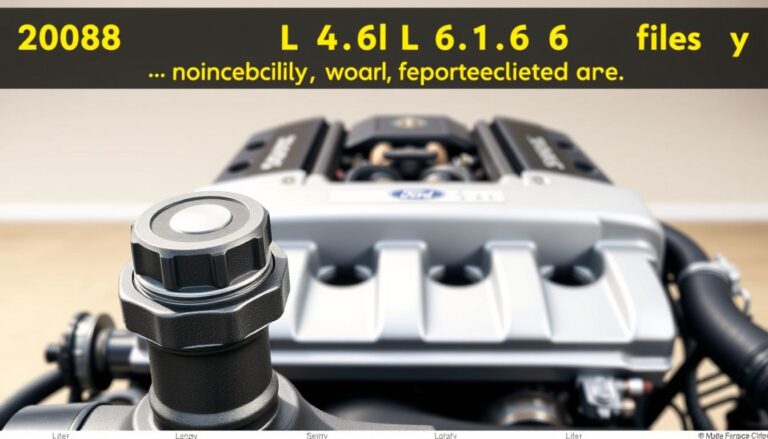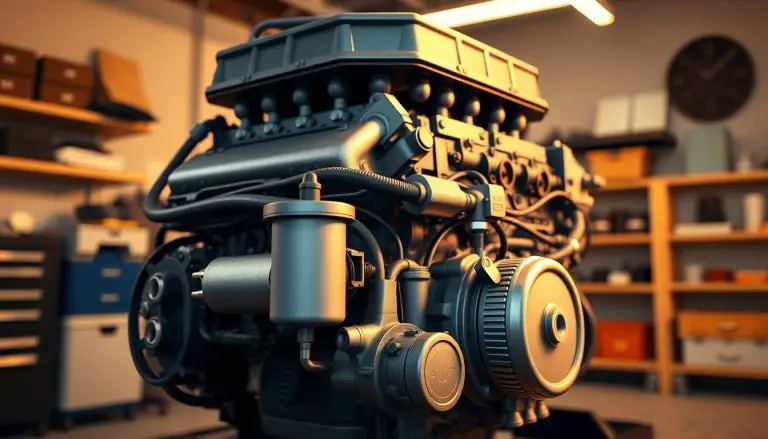The 5.4L Triton engine in the 2008 Ford F250 requires specific oil capacity and type to ensure optimal performance and longevity.
Using the correct oil capacity and type is crucial for the engine’s health, as it lubricates moving parts, prevents corrosion, and helps regulate engine temperature.
The 5.4L Triton engine is a powerful V8 engine, and maintaining it with the right oil specifications is vital for its durability and efficiency.
Key Takeaways
- The correct oil capacity for the 2008 Ford F250 5.4L engine is crucial for its performance.
- The recommended oil type for the 5.4L Triton engine is essential for its longevity.
- Regular oil changes are vital for maintaining the engine’s health.
- The 5.4L Triton engine requires specific oil viscosity for optimal performance.
- Using the wrong oil type or capacity can lead to engine damage.
The 2008 Ford F250 5.4L Triton Engine Specifications
Ford’s 5.4L Triton engine, featured in the 2008 F250, is a marvel of engineering, offering impressive performance and durability. This engine is a crucial component of the vehicle, providing the power needed for various applications.
Key Engine Features and Performance Data
The 5.4L Triton engine boasts several key features, including a cast iron block, three-valve design, and variable camshaft timing. These features contribute to its robust performance and efficiency. The engine produces 300 horsepower and 365 lb-ft of torque, making it suitable for heavy-duty tasks.
Common Applications and Towing Capacity
The 2008 Ford F250 with the 5.4L Triton engine is commonly used for towing and hauling heavy loads. It has a maximum towing capacity of up to 9,900 lbs, depending on the configuration and equipment. This makes it an ideal choice for those who need a reliable truck for heavy-duty applications.
Engine Design and Lubrication System
The engine’s design includes a robust lubrication system, essential for its longevity and performance. The lubrication system features a high-capacity oil pan and filter, ensuring that the engine is well-lubricated under various operating conditions.
| Engine Specifications | Details |
|---|---|
| Engine Type | 5.4L Triton V8 |
| Horsepower | 300 hp |
| Torque | 365 lb-ft |
| Towing Capacity | Up to 9,900 lbs |
2008 Ford F250 5.4L Oil Capacity and Oil Type Guide
Understanding the oil capacity and type for your 2008 Ford F250 5.4L engine is crucial for maintaining its performance and longevity. The correct oil capacity ensures that your engine is properly lubricated, reducing wear and tear on its components.
Total Engine Oil Capacity Specifications
The total engine oil capacity for the 2008 Ford F250 5.4L engine is approximately 7 quarts (6.6 liters) when the oil filter is changed. It’s essential to refer to your owner’s manual or consult with a professional mechanic to confirm the exact capacity for your specific vehicle.
Oil Pan and Filter Capacity Breakdown
The oil pan typically holds around 6 quarts (5.7 liters) of oil, with the remaining quart being for the oil filter. Ensuring the correct oil filter is used and properly tightened is vital to prevent leaks and maintain engine performance.
Factory Oil Type Requirements
Ford recommends using 5W-20 motor oil that meets the Ford specification WSS-M2C930-A or WSS-M2C945-A for the 5.4L engine. This viscosity rating is crucial for optimal engine performance in various temperatures.
Viscosity Ratings Explained
Viscosity ratings, such as 5W-20, indicate the oil’s flowability in different temperatures. The “5W” means the oil flows like a 5-weight oil in cold temperatures, while “20” indicates its viscosity at operating temperature. Choosing the right viscosity is vital for engine protection and fuel efficiency.
As emphasized by automotive experts, “Using the correct oil viscosity is crucial for engine longevity and performance.” Proper oil maintenance is not just about capacity but also about using the right type and viscosity.
By following the guidelines for oil capacity and type, you can ensure your 2008 Ford F250 5.4L engine remains in top condition, providing reliable performance and longevity.
Recommended Oil Formulations for Optimal Performance
Choosing the right oil formulation is crucial for the optimal performance of your 2008 Ford F250 5.4L Triton engine. The correct oil ensures that your engine’s components are well-lubricated, reducing wear and tear, and maintaining fuel efficiency.
Synthetic vs. Conventional Oil Benefits
When it comes to oil formulations, the debate between synthetic and conventional oil is ongoing. Synthetic oil offers superior performance in extreme temperatures, better lubricity, and longer oil change intervals. On the other hand, conventional oil is more economical and still provides adequate lubrication for many drivers. For the 5.4L Triton engine, synthetic oil is recommended for its enhanced benefits.
Ford-Approved Oil Brands and Specifications
Ford recommends using oil that meets its specification, WSS-M2C913-C or WSS-M2C930. Some Ford-approved oil brands include Motorcraft, Castrol, and Valvoline. It’s essential to check the oil bottle for these specifications to ensure compatibility.
Oil Additives and Their Effects on the 5.4L Engine
Oil additives play a crucial role in engine health. They include detergents, anti-wear compounds, and dispersants that help keep the engine clean and protected.
Detergents and Anti-Wear Compounds
Detergents help clean the engine by removing dirt and deposits, while anti-wear compounds protect moving parts from wear. These additives are vital for maintaining the longevity and performance of your 5.4L Triton engine.
Oil Change Intervals and Maintenance Schedule
Understanding the oil change intervals and maintenance schedule is crucial for the longevity of your 2008 Ford F250 5.4L engine. Regular maintenance ensures that your engine remains in good condition, reducing the risk of premature wear and potential failures.
Standard vs. Severe Duty Service Intervals
The 2008 Ford F250 5.4L engine has different oil change intervals based on driving conditions. For standard driving conditions, the recommended oil change interval is typically every 5,000 to 7,500 miles. However, for severe duty service, which includes frequent towing, driving in extreme temperatures, or driving in stop-and-go traffic, the interval is shortened to every 3,000 to 5,000 miles.

Professional vs. DIY Oil Change Procedures
When it comes to oil changes, vehicle owners have the option to either perform the task themselves (DIY) or have it done professionally. A DIY oil change can save money but requires the right tools and knowledge. On the other hand, a professional oil change ensures the job is done correctly, with the added benefit of a thorough inspection of other vehicle components.
Required Tools and Parts for Oil Service
For a successful oil change, you’ll need a few essential tools and parts. These include a socket wrench, oil drain pan, new oil filter, and enough motor oil to fill your engine. The 2008 Ford F250 5.4L engine requires 6 quarts of oil with a filter change.
Oil Filter Selection and Specifications
Selecting the right oil filter is crucial for your engine’s performance. Ford recommends using a Motorcraft oil filter or an equivalent that meets Ford’s specifications. The oil filter helps remove contaminants from the oil, ensuring your engine stays clean and runs efficiently.
By following the recommended oil change intervals and using the correct materials, you can help extend the life of your 2008 Ford F250 5.4L engine and maintain its performance.
Impact of Proper Oil Maintenance on Engine Longevity
The longevity of the 5.4L Triton engine in your 2008 Ford F250 heavily relies on consistent and proper oil maintenance. Proper lubrication is essential for reducing wear on moving parts, regulating engine temperature, and preventing corrosion.
Common Oil-Related Issues in the 5.4L Triton
The 5.4L Triton engine can be prone to certain oil-related issues, including oil leaks, sludge buildup, and excessive oil consumption. Regular checks can help identify these problems early.
- Oil Leaks: Often due to worn gaskets or seals.
- Sludge Buildup: Caused by infrequent oil changes or using the wrong oil type.
- Excessive Oil Consumption: May indicate worn piston rings or valve seals.
How Climate and Driving Conditions Affect Oil Selection
Climate and driving conditions play a significant role in determining the right oil for your vehicle. For instance, synthetic oil is recommended for extreme temperatures, while conventional oil may suffice for moderate climates.
| Climate/Condition | Recommended Oil Type |
|---|---|
| Extreme Cold | Synthetic 0W-20 or 0W-30 |
| Hot Desert | Synthetic 5W-30 or 5W-40 |
| Moderate | Conventional 5W-20 |
Warning Signs of Oil Problems
Being aware of the warning signs of oil-related issues can help prevent engine damage. These include:
- Dashboard warning lights indicating low oil pressure.
- Visible oil leaks under the vehicle.
- Unusual engine noises, such as knocking or clunking.
Monitoring Oil Pressure and Consumption
Regularly monitoring oil pressure and consumption can provide insights into your engine’s health. Low oil pressure may indicate a need for an oil change or a potential leak, while excessive consumption could signal internal engine wear.
Maintaining Your 2008 Ford F250 5.4L Engine: A Summary
Proper oil maintenance is crucial for the longevity and performance of your 2008 Ford F250 5.4L engine. As discussed, the 5.4L Triton engine requires a specific oil capacity and type to function optimally.
Using the correct oil formulation, such as those approved by Ford, and adhering to the recommended oil change intervals can significantly impact engine durability. Regular oil changes help prevent common issues associated with the 5.4L Triton engine, ensuring your vehicle runs smoothly and efficiently.
In summary, a well-maintained oil system is vital for the overall health of your engine. By following the guidelines outlined, you can help extend the life of your 2008 Ford F250 5.4L engine and maintain its performance over time. This oil maintenance summary highlights the importance of regular checks and maintenance to keep your vehicle in optimal condition.
FAQ
What is the oil capacity of the 2008 Ford F250 5.4L engine?
The total engine oil capacity for the 2008 Ford F250 5.4L engine is approximately 7 quarts, including the oil filter.
What type of oil is recommended for the 2008 Ford F250 5.4L engine?
Ford recommends using 5W-20 motor oil that meets the Ford WSS-M2C930-A specification. Synthetic oil is recommended for its superior performance in extreme temperatures.
How often should I change the oil in my 2008 Ford F250 5.4L engine?
The recommended oil change interval for the 2008 Ford F250 5.4L engine is every 5,000 to 7,500 miles under normal driving conditions, and every 3,000 to 5,000 miles under severe duty conditions.
Can I use conventional oil instead of synthetic oil in my 2008 Ford F250 5.4L engine?
While conventional oil can be used, synthetic oil provides better engine protection, especially in extreme temperatures. Ford recommends using synthetic oil that meets the WSS-M2C930-A specification.
What are the benefits of using synthetic oil in the 2008 Ford F250 5.4L engine?
Synthetic oil provides superior lubrication, better fuel efficiency, and improved engine protection in extreme temperatures. It also helps to reduce engine wear and tear.
How do I check the oil level in my 2008 Ford F250 5.4L engine?
To check the oil level, ensure the vehicle is parked on a level surface, turn off the engine, and wait a few minutes. Then, locate the oil dipstick, pull it out, and wipe it clean. Insert the dipstick back into the oil reservoir and pull it out again to check the oil level.
What are the signs of low oil level or oil degradation in the 2008 Ford F250 5.4L engine?
Signs of low oil level or oil degradation include dashboard warning lights, unusual engine noises, decreased fuel efficiency, and visible leaks. Regular oil checks can help identify these issues early.
Can I perform an oil change on my 2008 Ford F250 5.4L engine myself?
Yes, you can perform an oil change yourself if you have the necessary tools and follow the correct procedure. However, it’s recommended to consult a professional mechanic if you’re unsure.



